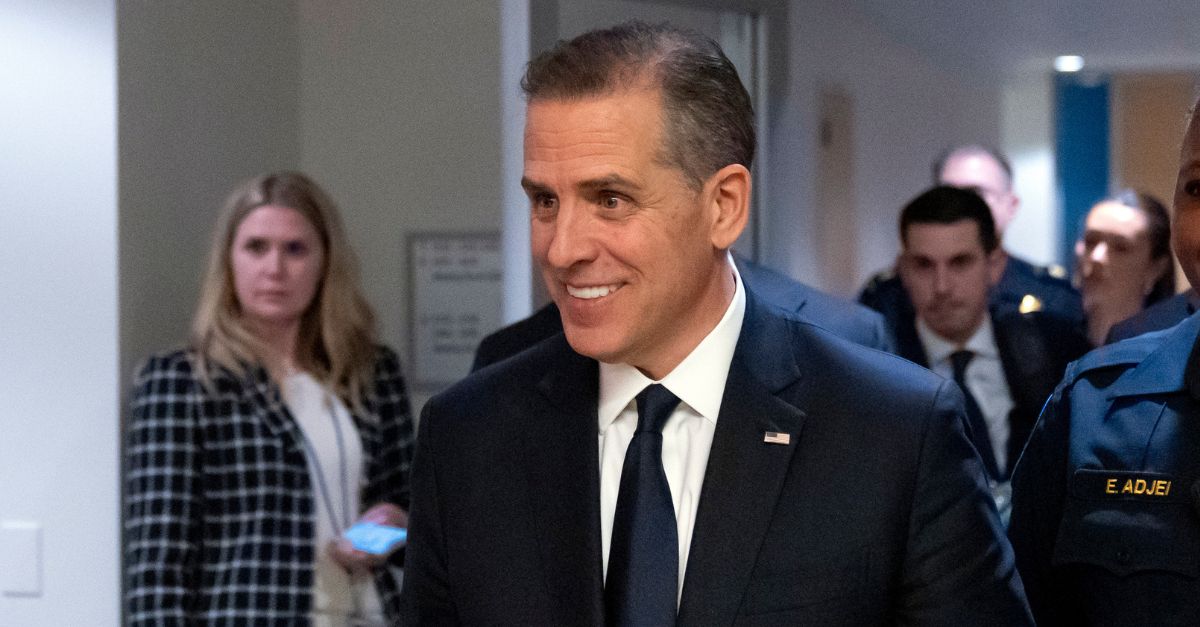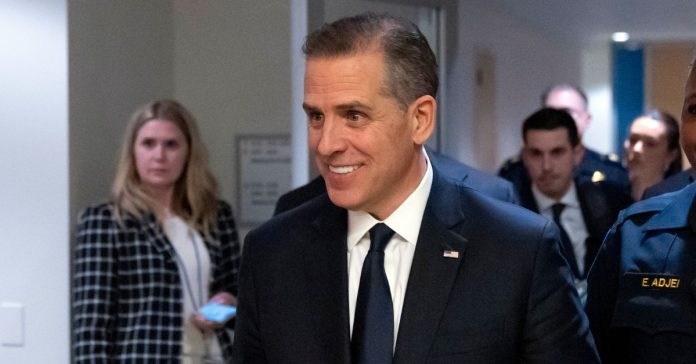
Hunter Biden departs after a closed door private deposition with House committees leading the President Biden impeachment inquiry, on Capitol Hill, Wednesday, Feb. 28, 2024, in Washington. (AP Photo/Alex Brandon)
A judge appointed by Donald Trump says that Hunter Biden failed to show that the federal gun charges against him were politically motivated — and has ordered him to proceed with trial set for next month.
In three separate rulings issued Friday, U.S. District Judge Maryellen Noreika rejected efforts by President Joe Biden’s son to get the charges against him dropped. As Law&Crime has previously reported, Hunter Biden is accused of lying about his drug use when applying for a gun permit. The triple loss echoes rulings made earlier this month allowing the prosecution on misdemeanor tax charges to proceed.
In trying to get the charges dropped, Biden argued that the prosecution of him was “vindictive,” and that he was “selectively charged for an improper political purpose” because his father is presently the president and is running for reelection.
Noreika strongly disagreed, finding that Biden was unable to even identify the basis for alleged discrimination that would form the basis of the vindictive prosecution claim.
“Defendant’s claim of selective prosecution differs from the more common equal protection arguments seen in cases where selective prosecution is raised — e.g., the protected class comprised of individuals of a certain race or nationality,” the judge writes. “In fact, Defendant struggles to define the class to which he belongs.”
Noting that Biden “never argues that he is being selectively prosecuted because he is a member of any specific political party or because he engaged in any specific political activity,” he instead posits that he is being targeted because he is “politically affiliated with his father.”
“Thus, Defendant’s articulated protected class is apparently family members of politically-important persons,” the judge notes.
Noreika expanded on this finding in a footnote:
To the extent that Defendant’s claim that he is being selectively prosecuted rests solely on him being the son of the sitting President, that claim is belied by the facts. The Executive Branch that charged Defendant is headed by that sitting President — Defendant’s father. The Attorney General heading the DOJ was appointed by and reports to Defendant’s father. And that Attorney General appointed the Special Counsel who made the challenged charging decision in this case — while Defendant’s father was still the sitting President. Defendant’s claim is effectively that his own father targeted him for being his son, a claim that is nonsensical under the facts here. Regardless of whether Congressional Republicans attempted to influence the Executive Branch, there is no evidence that they were successful in doing so and, in any event, the Executive Branch prosecuting Defendant was at all relevant times (and still is) headed by Defendant’s father.
Even if Biden’s claim was “cognizable,” the judge found, he “failed to come forward with ‘clear evidence’ that similarly situated individuals (i.e., people who are not family members of politically-important persons) have not been prosecuted for comparable firearm-related conduct.”
Noreika found that Biden similarly failed to prove evidence of “vindictiveness” in his prosecution, noting that Biden “does not accuse” special prosecutor David Weiss “of harboring any actual animus towards him.” Instead, Biden pointed the finger at “a number of other individuals — the former president, his supporters and ‘other opponents of the Bidens.””
The timing, however, matters. According to the judge:
Yet, as was the case with selective prosecution, the relevant point in time is when the prosecutor decided to no longer pursue pretrial diversion and instead indict Defendant. Whether former administration officials harbored actual animus towards Defendant at some point in the past is therefore irrelevant. This is especially true where, as here, the Court has been given no evidence or indication that any of these individuals (whether filled with animus or not) have successfully influenced Special Counsel Weiss or his team in the decision to indict Defendant in this case. At best, Defendant has generically alleged that individuals from the prior administration were or are targeting him (or his father) and therefore his prosecution here must be vindictive. The problem with this argument is that the charging decision at issue was made during this administration — by Special Counsel Weiss — at a time when the head of the Executive Branch prosecuting Defendant is Defendant’s father.
Noreika also rejected Biden’s effort to obtain discovery from Trump administration officials, including former Attorney General Bill Barr, former Acting Deputy Attorney General Richard Donoghue, former Acting Attorney General Jeffrey Rosen — and Trump himself.
“Defendant was not charged with the current (or any) firearm offenses while any of the four individuals held office,” the judge writes. “The decision to prosecute Defendant was made by and during the current administration — one headed by Defendant’s father and an Attorney General appointed by and serving at the pleasure of Defendant’s father. And that Attorney General appointed the current Special Counsel — i.e., the prosecutor who decided to abandon pretrial diversion and seek indictment in this case in the summer of 2023.”
As national security attorney and Law&Crime contributor Bradley Moss noted, arguments similar to Biden’s have been rejected before — albeit under somewhat different circumstances.
“If these motion terms sound familiar,” Moss wrote on X (formerly Twitter), “it’s because many of them were used (with slightly different context) by Trump in his own cases. Those have all failed to date as well.”
Noreika also rejected Biden’s dismissal argument that an earlier diversion agreement linked to his misdemeanor tax case gave him immunity from the firearms charges, as well as Biden’s allegations that the appointment of Weiss as special counsel was unlawful.
Biden’s trial is set to start on June 3. Noreika scheduled a pretrial conference — requiring Biden’s presence — for May 24.
Have a tip we should know? [email protected]

